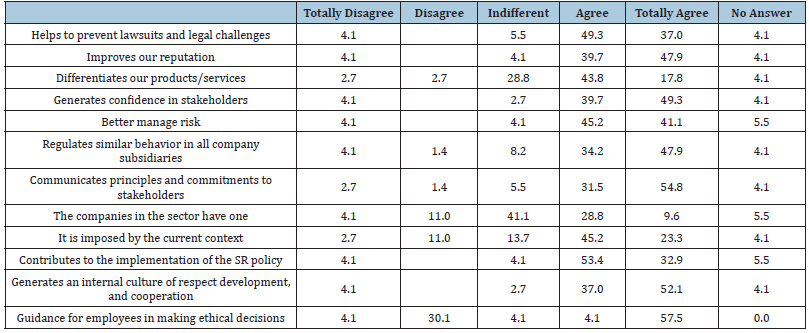- Submissions

Full Text
Strategies in Accounting and Management
What Motivates Spanish Companies to Develop a Code of Ethics?
Araceli de los Ríos-Berjillos1*, Salud Millán-Lara2, Mercedes Ruiz-Lozano2 and Ignacio Sepúlveda3
1Department of Business Management, Universidad Loyola Andalucía, Spain
2Department of Financial Economics and Accounting, Universidad Loyola Andalucía, Spain
3Department of Humanities and Philosophy, Universidad Loyola Andalucía, Spain
*Corresponding author: Araceli de los Ríos-Berjillos, Department of Business Management, Universidad Loyola Andalucía, Córdoba, Spain
Submission:March 25, 2022Published: May 20, 2022

ISSN:2770-6648Volume3 Issue3
Abstract
Among Spanish companies, there has been a great development of ethical codes. Regulatory compliance and the management of potential criminal risks may be behind this behavior. The aim of this paper is to analyze the reasons behind the proliferation of ethical codes among Spanish companies. To this end, a survey was carried out among company executives. The results show that the development of a company’s ethical culture is one reason, among others, for companies to adopt a code of ethics. Codes of ethics are, therefore, a tool that integrates the perspective of compliance and the active promotion of an ethical culture.
Introduction
Ethical management is not only understood as the application of values in decision making, but, as Laasch and Conaway [1] indicate, it is also defined as a process where ethical issues are addressed through management tools. One such management tool is the ethical code. Ethical codes capture the organization’s overall value system, define its purpose, and provide guidelines for decision making consistent with these principles [2]. By other hand, the governance of sustainability in production and consumption is giving rise to multiple international and national regulations to which companies must adhere [3]. Babri et al. [4] highlight, from the review of works that have analyzed the content of ethical codes, that regulatory and legal influence on the content of the code is a consistent theme. The most recent research coincides in highlighting that the compliance approach is complementary to that of promoting a context of integrity in the organization [5,6]. For Geddes [6] those companies that are able to combine and implement ethics based on compliance and integrity will have a competitive advantage over other companies in the same industry. Ethical codes are a good integrating element of both ethical perspectives. In the case of Spain, ethical codes received a concrete boost when they were included in the seventh recommendation of the Parliamentary Subcommittee, created by the Congress of Deputies to promote corporate social responsibility practices in Spanish companies. Likewise, the Criminal Code (BOE-2015, art.31 bis, 2) establishes the requirement that a company must meet in order to be exempt from criminal liability in the event that someone in its organization commits a crime under certain circumstances: to have “adopted and effectively implemented an organizational and management model that is adequate to prevent crimes of the nature of the one that was committed or to significantly reduce the risk of its commission, ...”. In the same way, regulation UNE 19601, about criminal compliance management systems, recognizes codes of ethics as an expression of the compliance policy. There is no regulation that obliges companies to establish a code of ethics, but there is a general consensus on the role of ethical codes as a fundamental tool of corporate compliance. According to a study by the global professional services organization BDO [7], 75% of Spanish companies have already implemented a code of ethics as a generic guideline for decision-making. The objective of this paper is to analyze what are the motivations that lead Spanish companies to adopt ethical codes; are regulatory compliance and criminal risk management the main reasons for adopting a code of ethics?
Results
A survey was developed to obtain information related to the availability or not of a code of ethics and the reasons that motivated them to do so. The survey was addressed to managers and decision-makers of Spanish companies, and 73 questionnaires were answered. The 71.2% of the organizations correspond to the classification of large companies and that 87.6% have a national or international scope of action. Only 3 companies do not have a code of ethics. These pointed the low probability that they will have one, since they say that they do not see it as necessary and do not have someone in charge of the company’s ethical problems. Two of them consider that the code of ethics does not add value to the business, and that they do not have the time to elaborate it and have not thought about it. As for the companies that have developed their code, very few did so before 2000. Twenty-seven percent did so between 2000 and 2008 and 59% after the 2008 economic crisis. Likewise, 86% opted for their own model code of ethics. Between 20% and 25% of respondents consider that the sector code meets the needs of their company and that it responds to the critical aspects of the sector, being respected by the companies in the sector. With regard to the reasons why they considered that it was good to have a code of ethics (Table 1), most of the respondents agreed or fully agreed with the issues raised (over 80%). It should be noted that 41.1% of the companies are indifferent to the fact that other companies in the sector have a code of ethics, and that 28.8% think that it does not affect the differentiation of their products or services, while 30.1% think that a code of ethics does not serve as a guide for employees in making ethical decisions.
Table 1: Evaluation of the reasons why it is perceived to be good for the company to have a code of ethics (in %).

Conclusion
The ethic code can be part of a management system with an integrated approach to manage all types of risks, prevent lawsuits and legal challenges, and to promote an ethical culture in the company. There are, therefore, multiple reasons for companies to develop a code of ethics. Although regulatory compliance is an important reason, other reasons carry more weight, for example, the development of an internal culture of respect and cooperation. It is worth pointing out the lack of incidence of the theory of legitimacy, it is not acted by mimetic isomorphism in this case, since they do not give importance to the fact that other companies in the sector have it. One area for improvement identified is the role of codes of ethics in guiding the ethical decision making of employees.
References
- Laasch O, Conaway R (2015) Principles of responsible management: Glocal sustainability, responsibility, ethics. mason: Cengage.
- Sims RR (1991) The institutionalization of organizational ethics. Journal of Business Ethics 10(7): 493-506.
- De Bakker F, Rasche A, Ponte S (2019) Multi-Stakeholder initiatives on sustainability: A cross-disciplinary review and research agenda for business ethics. Business Ethics Quarterly 29(3): 343-383.
- Babri M, Davidson B, Helin S (2021) An updated inquiry into the study of corporate codes of ethics: 2005-2016. Journal of Business Ethics 168(1): 71-108.
- Calderón R, Piñero R, Redín DM (2018) Can compliance restart integrity? toward a harmonized approach. The example of the audit committee. Business Ethics: A European Review 27(2): 195-206.
- Geddes BH (2017) Integrity or compliance based ethics: Which is better for today’s business? Open Journal of Business and Management 5(3): 420-429.
- BDO (2019) Report expectations and trends in the Spanish company 2019.
© 2022 Araceli de los Ríos-Berjillos. This is an open access article distributed under the terms of the Creative Commons Attribution License , which permits unrestricted use, distribution, and build upon your work non-commercially.
 a Creative Commons Attribution 4.0 International License. Based on a work at www.crimsonpublishers.com.
Best viewed in
a Creative Commons Attribution 4.0 International License. Based on a work at www.crimsonpublishers.com.
Best viewed in 







.jpg)






























 Editorial Board Registrations
Editorial Board Registrations Submit your Article
Submit your Article Refer a Friend
Refer a Friend Advertise With Us
Advertise With Us
.jpg)






.jpg)














.bmp)
.jpg)
.png)
.jpg)










.jpg)






.png)

.png)



.png)






